#how to study a language
Text
Every now and then I think about how subtitles (or dubs), and thus translation choices, shape our perception of the media we consume. It's so interesting. I'd wager anyone who speaks two (or more) languages knows the feeling of "yeah, that's what it literally translates to, but that's not what it means" or has answered a question like "how do you say _____ in (language)?" with "you don't, it's just … not a thing, we don't say that."
I've had my fair share of "[SHIP] are [married/soulmates/fated/FANCY TERM], it's text!" "[CHARACTER A] calls [CHARACTER B] [ENDEARMENT/NICKNAME], it's text!" and every time. Every time I'm just like. Do they though. Is it though. And a lot of the time, this means seeking out alternative translations, or translation meta from fluent or native speakers, or sometimes from language learners of the language the piece of media is originally in.
Why does it matter? Maybe it doesn't. To lots of people, it doesn't. People have different interests and priorities in fiction and the way they interact with it. It's great. It matters to me because back in the early 2000s, I had dial-up internet. Video or audio media that wasn't available through my local library very much wasn't available, but fanfiction was. So I started to read English language Gundam Wing fanfic before I ever had a chance to watch the show.
When I did get around to watching Gundam Wing, it was the original Japanese dub. Some of the characters were almost unrecognisable to me, and first I doubted my Japanese language ability, then, after checking some bits with friends, I wondered why even my favourite writers, writers I knew to be consistent in other things, had made these characters seem so different … until I had the chance to watch the US-English dub a few years later. Going by that adaptation, the characterisation from all those stories suddenly made a lot more sense. And the thing is, that interpretation is also valid! They just took it a direction that was a larger leap for me to make.
Loose adaptations and very free translations have become less frequent since, or maybe my taste just hasn't led me their way, but the issue at the core is still a thing: Supernatural fandom got different nuances of endings for their show depending on the language they watched it in. CQL and MDZS fandom and the never-ending discussions about 知己 vs soulmate vs Other Options. A subset of VLD fans looking at a specific clip in all the different languages to see what was being said/implied in which dub, and how different translators interpreted the same English original line. The list is pretty much endless.
And that's … idk if it's fine, but it's what happens! A lot of the time, concepts -- expressed in language -- don't translate 1:1. The larger the cultural gap, the larger the gaps between the way concepts are expressed or understood also tend to be. Other times, there is a literal translation that works but isn't very idiomatic because there's a register mismatch or worse.
And that's even before cultural assumptions come in.
It's normal to have those. It's also important to remember that things like "thanks I hate it" as a sentiment of praise/affection, while the words translate literally quite easily, emphatically isn't easy to translate in the sense anglophone internet users the phrase.
Every translation is, at some level, a transformative work. Sometimes expressions or concepts or even single words simply don't have an exact equivalent in the target language and need to be interpreted at the translator's discretion, especially when going from a high-context/listener-responsible source language to a low-context/speaker-responsible target language (where high-context/listener responsible roughly means a large amount of contextual information can be omitted by the speaker because it's the listener's responsibility to infer it and ask for clarification if needed, and low-context/speaker-responsible roughly means a lot of information needs to be codified in speech, i.e. the speaker is responsible for providing sufficiently explicit context and will be blamed if it's lacking).
Is this a mouse or a rat? Guess based on context clues! High-context languages can and frequently do omit entire parts of speech that lower-context/speaker-responsible languages like English regard as essential, such as the grammatical subject of a sentence: the equivalent of "Go?" - "Go." does largely the same amount of heavy lifting as "is he/she/it/are you/they/we going?" - "yes, I am/he/she/it is/we/you/they are" in several listener-responsible languages, but tends to seem clumsy or incomplete in more speaker-responsible ones. This does NOT mean the listener-responsible language is clumsy. It's arguably more efficient! And reversely, saying "Are you going?" - "I am (going)" might seem unnecessarily convoluted and clumsy in a listener-responsible language. All depending on context.
This gets tricky both when the ambiguity of the missing subject of the sentence is clearly important (is speaker A asking "are you going" or "is she going"? wait until next chapter and find out!) AND when it's important that the translator assign an explicit subject in order for the sentence to make sense in the target language. For our example, depending on context, something like "are we all going?" - "yes" or "they going, too?" might work. Context!
As a consequence of this, sometimes, translation adds things – we gain things in translation, so to speak. Sometimes, it's because the target language needs the extra information (like the subject in the examples above), sometimes it's because the target language actually differentiates between mouse and rat even though the source language doesn't. However, because in most cases translators don't have access to the original authors, or even the original authors' agencies to ask for clarification (and in most cases wouldn't get paid for the time to put in this extra work even if they did), this kind of addition is almost always an interpretation. Sometimes made with a lot of certainty, sometimes it's more of a "fuck it, I've got to put something and hope it doesn't get proven wrong next episode/chapter/ten seasons down" (especially fun when you're working on a series that's in progress).
For the vast majority of cases, several translations are valid. Some may be more far-fetched than others, and there'll always be subjectivity to whether something was translated effectively, what "effectively" even means …
ANYWAY. I think my point is … how interesting, how cool is it that engaging with media in multiple languages will always yield multiple, often equally valid but just sliiiiightly different versions of that piece of media? And that I'd love more conversations about how, the second we (as folks who don't speak the material's original language) start picking the subtitle or dub wording apart for meta, we're basically working from a secondary source, and if we're doing due diligence, to which extent do we need to check there's nothing substantial being (literally) lost -- or added! -- in translation?
#translation#linguistics (sorta)#I love language so much#long post#subtitling#dubbing#transformative work#if you read all the way to the end - THANK YOU I am so impressed#localisation#this is not an academic essay but I still feel bad for not citing sources#low vs high context cultures and languages are concepts from intercultural communication studies#but idk how up to date that is or whether folks even still actually use them#I know they oversimplify things#but it helped me say what I was trying to here so shrug#languages#language soup#meta#language meta#fandom meta of sorts#thanks for the help sorting this out kayla <3#my nonsense
1K notes
·
View notes
Text



Experimenting with different visual cues to show that a character is not quite fluent in a language yet. Commentary and extras below the cut.
(the other language is kalaallisut, a real language spoken in greenland, albeit machine translated and probs not 100% accurate)
1. Blurred bits
I feel like this one isn't very visually pleasing, but it speaks to me more regarding how learning a language feels. You don't quite make out what the words are, and slowly pick up bits from what is being said. This also adds room for uncertainty on the character's POV, the speech bubble wouldn't be theirs, but what you read off it would be their thoughts regarding whats being said. The blur also helps keeping things incomprehensible even if you speak the other language being spoken.
2. Bits in multiple languages
This one adds room for out of the speech bubble commentary. It doesn't make misunderstandings as easy as with the blurred speech, and with an agglutinative language like kalaallisut it might end up being confusing to organise or break the sentence's syntax. It looks cleaner than the blurred bits though, and it still makes the other language incomprehensible (if you dont speak kalaallisut, that is). Colour coding would help indicate whats being understood by the main character and what isnt, and the texts would slowly be fully red across the chapters.
3. Faded colour to indicate not understanding
This makes the reader able to understand everything, and relies on the reader memorising that faded = not understood by the character. Other than that, colour coding would indicate a change of languages.
I like the reader only understanding what the character can understand and I like the types that leave kalaallisut still visible. Though option 3 might be cleaner and easier to manange.
4. Faded colour + blur
This is something I thought after posting it earlier on patreon. Blurring the parts the main character wouldn't understand can be a way for the brain to quickly skip through the missed text, in hopes that at least the first reading will match what the character is understanding.
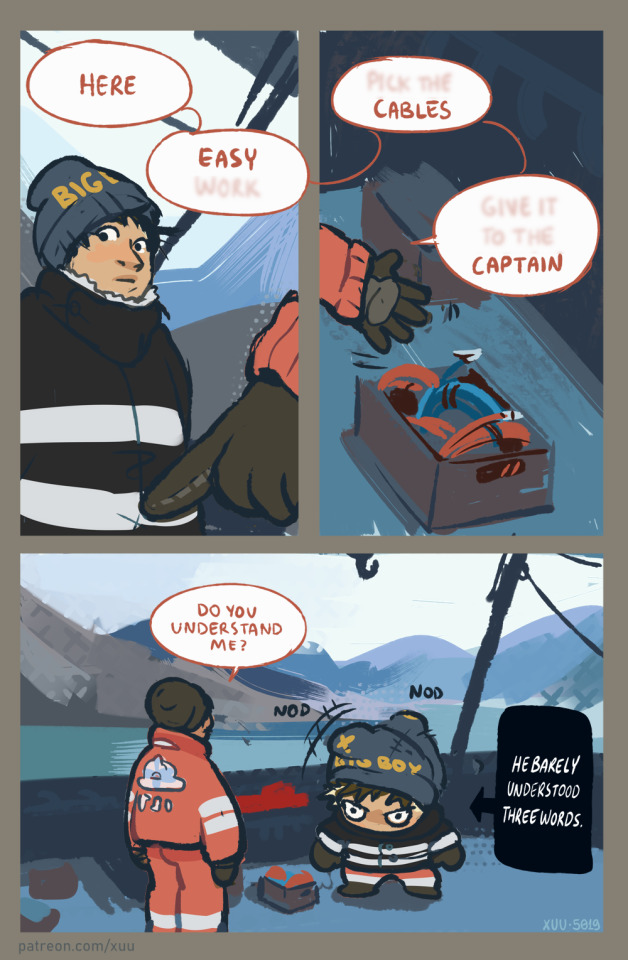
Also, for the enjoyment of my 4 greenlandic followers, heres the machine translated kalaallisut version I used for 1 & 2. I had to use a double way translation tool and an annotation tool to be sure the words were somewhat related to what I wanted them to be. I can't really fact check it though, so I hope that whichever way the translator messed up is at least worth a chuckle.
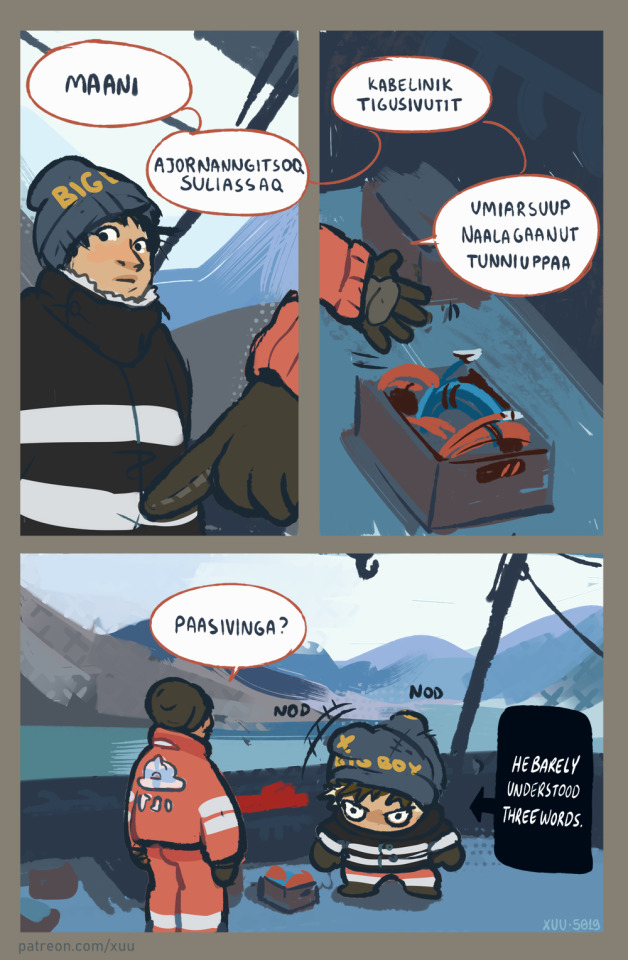
If you'd like to see more of this kinda stuff, please consider supporting me on patreon
#comic#marangatu#language learning#brart#brazilian artist#latino artists#brazilian artists#greenland#if i were to make this a big project id hire a translator btw#and fool myself into learning a 7th language probably#the more languages you learn the less you care about how many people speak it or how profitable it'd be#sometimes the most dellicious languages to study are hidden in a 800km range area#also its amazing to see how many different ways there are out there to structure words and make sentences. i love languages#kalaallisut#comics
262 notes
·
View notes
Text
Look, I knew five languages by age 19 and now I am learning like 3 more. I work as a language instructor and a consultant. If I can give language learners only one advice, this is it.
STOP LEARNING WORDS ON THEIR OWN.
You're doing yourself a disservice by learning lists of "30 words you must know!" "100 most common words!" like it literally means nothing if you cannot use those words in an appropriate context with proper grammar. So what you actually need to do is learn those words via example sentences.
Of course, sentences have more words so you may think you're learning less but you're actually learning the way to use it in context. That's what's important.
Language is about communication, which also means if you want to learn languages, you have to observe how people communicate with each other universally. Native speakers never have a list of words they know and they don't count every single new word they've learned. So why are you doing it to yourself? What native speakers do is listen to the new word, remember the context they're spoken in, and keep using that word in that context. And that's why people go "wait, you can use that word LIKE THAT?" all the time. So you, a language learner, are also allowed to do that. I'm not even saying those word lists are useless but they're the most useful AFTER you've known most of them and are trying to go over them for practice etc. Native speakers do click on those word lists to check out how many words they don't know or to remind themselves of those words or to learn some facts about each word. That should be your goal as well.
Learn sentences. Learn them in context. Do not fall into the "I must know xx amount of words or I'm a failure at language learning" trap perpetuated by bloggers or youtubers or whatever. Have fun with it!
#language learning#studyblr#langblr#100 days of productivity#chinese studyblr#japanese studyblr#korean studyblr#how to learn#learning#academia#academic#academics#language study#language#languages#study tip#study#study motivation
369 notes
·
View notes
Text
im so sad the guy making the 6+ language minecraft server sucks so bad because that is a perfect study for a linguistic anthropology person like me but knowing the person running it it will be a mess and people will be bummed with it in like 20 seconds
#grace post#like if the goal was to study. how people try to communicate across languages and cannot understand each other. that is a genuinely#very interesting concept. but thats much better studied in a less serious joking environment and not the... lore stuff the guy running it#seems to prefer.#this is also why i find the spanish-english smp where most but not all people are bilingual to be great to study. aurgh
1K notes
·
View notes
Text









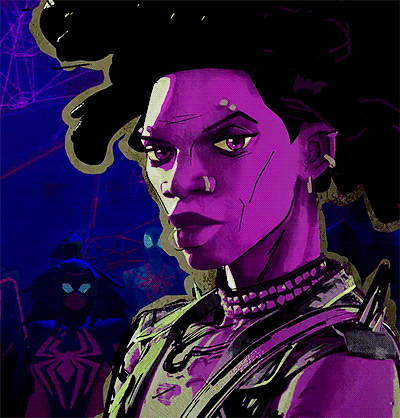






Spider-Man: Across the Spider-Verse (2023)
So we're just supposed to let people die because some algorithm says that that's supposed to happen? You realize how messed up that sounds, right?
#spiderman#across the spiderverse#atsv#atsvedit#spider punk#hobie brown#miles morales#marveledit#spidermanedit#spiderman across the spiderverse#punkflower#atfirst this was supposed to be a few gifs of like a study how interesting it was that hobie had his back turned to miguel during this scen#(the themes situation-wise and body language of all that!! closed to miguel. opened and listening to miles. just!!)#and at the same time he kept eye contact or looking at miles the whole time#(not to miss the beginning of the revolution) “there we go”#but it slowly turned into just an appreciation of this whole scene again mostly with hobie but like. its so cool#to see how at first miles was excited to be a part of that society and dismissing hobie's concerns. bc he didnt have the whole picture#but then hobie was the only one always looking out for him#and then the whole making the rogue watch to go save miles ahhh i just love this movie so much#mine#gif:spiderman#spiderman across the spider verse#across the spider verse spoilers#across the spider verse fanart#flashing gif //#flashing gifs //#eyestrain //
620 notes
·
View notes
Text
Guys I was playing the event stories again one last time before they went away forever and I just noticed the sweetest fucking thing ever
When you first walk up to Zayne and catch him on his phone, look at his face. He goes from his normal neutral expression to the softest little smile when he realizes it's you/mc walking up to him 🥺🥺🥺



He even straightens himself up a little taller when he sees you i'm dying send help 😩

I'm gonna squish him 🥲
#this moment is literally less than a second in the game#and its the very first second of the scene so its so easy to miss#if you still have access to the event PLEASE go see it is so so so cute#as someone who spent years and years professionally studying body language- All of my love goes to the programmers of LnDS#i could write for ages on all of the movements and little mannerisms they have and how in tune they are with their psych profiles#but this little 1 second moment right here? its perfect#when I saw him straighted up a little as his eyes got all soft i melted ahh#love and deepspace#lads#l&ds#lnds#love & deepspace#zayne#zayne love and deepspace#love and deepspace zayne
176 notes
·
View notes
Text
btw! from twitter, some context from qforever and qcellbits convo

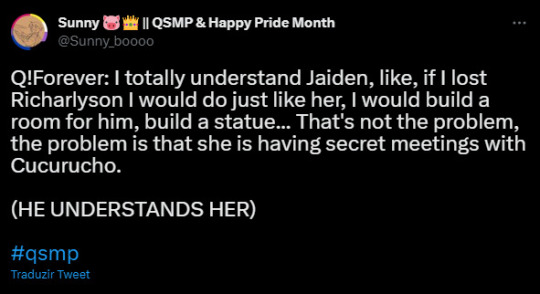
#qsmp#miscommunicatios bc of language barrier is gonna make me insane#as people has been saying around please take whats said in english by non native speakers with a grain of salt bc they sometimes#cant express their idea fully#qforever is very CLEAR abt what is his tought process in ptbr#but he fumbles a lot in english bc he doesnt have an extensive vocabulary to articualte well#(he even asked for cellbits help in the trial thing bc cellbit knows how to do this in english#but theire still more clear in ptbr#im asking this very nicely please consult anyone whos fluent in ptbr/esp/fr if youre a native english speaker and wants more context#before trying to come up with analysis and lore and character studies as well#bc the ccs explain to their audience in their native language important points abt their view#that can be very much lost#<- qbrs defender
412 notes
·
View notes
Text

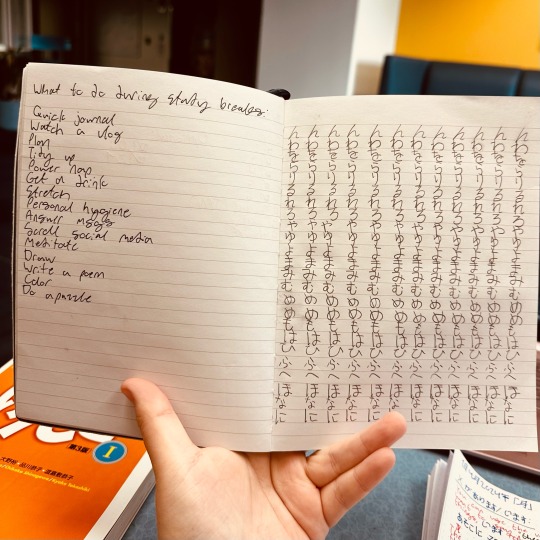


1日4月2024年 「月」
I’ve already gotten a lot done and it’s not even noon. Yesterday I didn’t post because I barely left my dorm, but I got a lot done yesterday too.
What I’ve Done:
Anki
WaniKani
Writing drills
Watched one episode of Given (no spoilers, I’m up to episode 9 so I’m almost done)
What I Have Left To Do:
Genki Chpt 4 review
I’m glad I took a rest day on Saturday, but also I realized Friday night that I was kinda gonna be forced to because I went to my girlfriend’s brother’s house to see my niece and nephew.
I’m taking a break for a few hours and then I’m gonna get back to it.
#japanese langblr#japanese studyblr#langblr#studyblr#japanese studyspo#japanese study#language study#language learning#japanese language#study goals#study methods#study blog#studyspo#study motivation#studying#study aesthetic#op#i’ll never get over how many tags that is#also thank you for all the boops#i’m booping back through my main
83 notes
·
View notes
Text
"oh, Charles, you're such an angel."
Max hears it often. he picks up the phrases chirped by the girls around. it was said by fans, PR managers and once he had even heard it from a Ferrari mechanic. and Max totally and utterly disagrees.
Charles is no angel. on and off the track.
he is a bloody menace.
because angels don't look like that. with a slight squint when there's a storm brewing in the depths of green eyes in the middle of a sunny day.
angels don't get so angry you're afraid to approach. angels don't hold grudges. angels are quick to forgive.
angels don't smile like that. smirking, a little arrogant, covering it with their innocence. and showing a little of the soft tip of the tongue between their teeth.
angels are measured. they take their time. they are neat and tidy. they never make a mess of crumpled sheets and clothes.
angels are gentle. angels never squeeze skin until it bruises, bite until it darkens, or pull hair so hard it brings tears to the eyes.
and even more so, angels don't moan. not painfully, but sweetly, like melted chocolate with marzipan that leaves marks on your fingers. hot. frank. naked. absolutely wasted.
angels don't expose their necks, don't bare collarbones, giving more space for someone’s lips to leave marks.
angels don't press closer, scratching back until it’s bleeding. angels don’t choke on passion and never create their own.
but he falls asleep in the most angelic way. with his nose against Max's neck and the blanket pulled up to his eyes. he throws an arm and a leg over the body next to him, pulls closer, smiles warmly, and lowers his long fluffy eyelashes.
people easily fall for it.
"oh, Charles, you're such an angel."
but Max knows that Charles isn't an angel at all. he's a real demon in the flesh. but it's much easier to love him like that.



#lestappen#drabble#red and black drabble#i don't know wtf has happened to me i never wrote anything guess im going crazy and its lestappen's fault#I'll do whatever just not to study pružnost a pevnost#its like strength and flexibility of materials in czech?.. creepy shit but very important#and english of course is not my first language so i really hope that i didn't do any mistakes#but i love their duality and how everyone percieves Charles as “angel” when he's a real menace#so yeah i hope you enjoyed#have a great day everyone!!
165 notes
·
View notes
Text
What I think is so important to learning how to truly appreciate life is learning how to appreciate the creatures and things we've categorized as "disgusting" or "gross."
When I learned to appreciate wasps, I realized how much they just... don't really care about anything, and they're not trying to be an asshole because they're uniquely cruel. If they have any wants, it is to live. Why would I punish that when I also want to live?
This isn't to say you need to fall in love with the creepy crawlies that stalk this world or to love what you cannot, but to recognize that in their arrangement of atoms, they are trying to persevere, and in the end... aren't we all?
#positivity#bugs tw#this is why i think science is a love language btw#learning to love and appreciate through study is still love and appreciation#i've always been fine with bugs which might make this ring hollow to somebody with a phobia#and this isn't saying that people who are phobic of bugs are Evil or dumb (quite the opposite- humans are Good at fearing things)#what this is saying is find something you don't appreciate and learn about why you should appreciate it - for whatever reason#i learned to stop being neutral about bugs when i learned how cool they are - how they live!#i stopped being neutral about this planet when i learned how ancient it is!#i stopped being neutral about humans when i learned about how we lived and survived and loved!#i stopped being neutral about these things because i started to love them because i saw just how intricate EVERYTHING is#when you learn to see things through an appreciative lens you sometimes direct that viewpoint inward#so now instead of viewing myself as outside the universe i see myself and every little bug as PART of the universe#i stopped believing that i almost... wasn't worthy of being Part of Nature when i realized just how big everything is in the scale of it al#you should see my google searches omfg#everything is an argument and boy does this world have the ability to argue so well
177 notes
·
View notes
Text
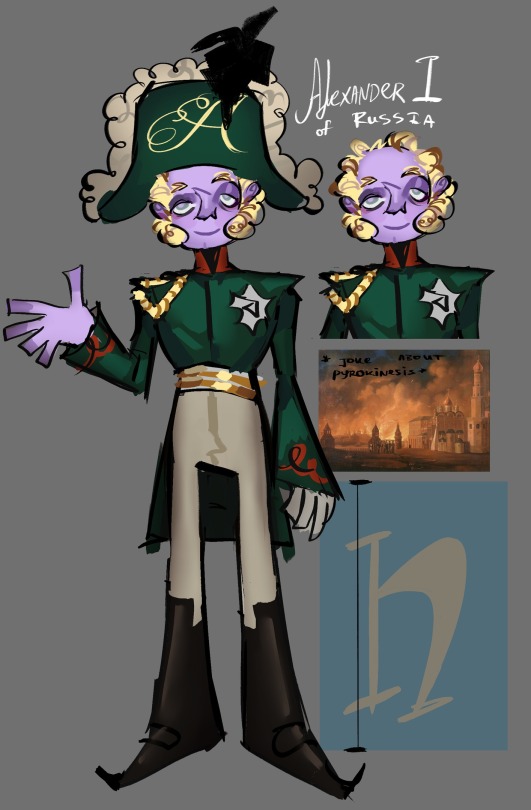
some other psychonaut art from the last year I never posted!! again :)
mosty bonapartes and one (1) crispin
i should draw something new but my mind is filled with fog at the moment. ah. !!!
cw: blood under the cut + heavily censored . gore(???)

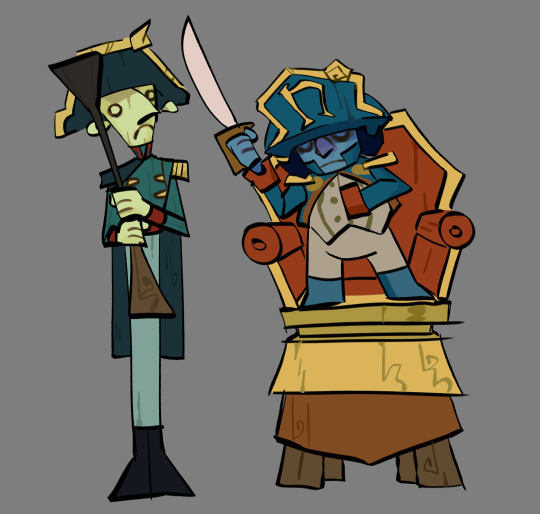
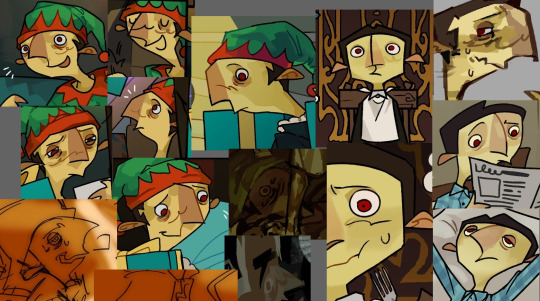
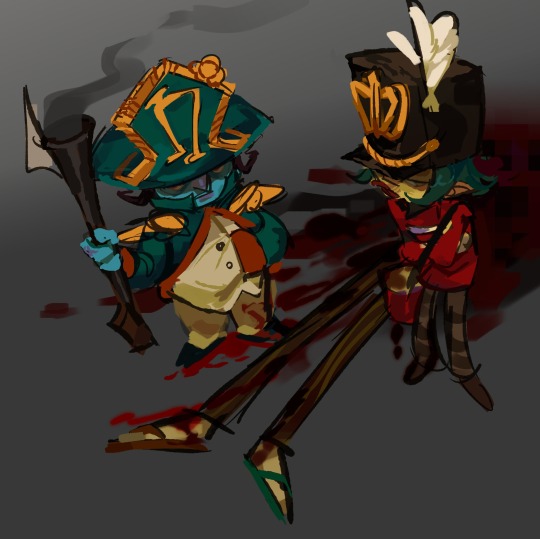
#*some sort of joke about alexander and m1lik being related because they both (presumably) slavic and purple*#how do i even tag this blond bitch#can you call sashen'ka <3 a psychonauts oc? crying#i like alexander as a historical figure. it's a shame i know so little about r0manovs tho.. I should read more about them...#i like history a lot............. i just never seen much of my homeland or studied in my first language to know these things. I fear.#i know some stuff about serb1a tho :)#cw blood#tw blood#<- just to be safe#psychonauts#fred bonaparte#crispin whytehead#napoleon psychonauts#art tag
82 notes
·
View notes
Text
Self / Independent Learner's Guide to Language Learning From Zero
-a mini study plan
I used this for Spanish, French and Italian, it is my favourite way of starting to learn. It won't teach you the langauge but if this is your first time, if you feel confused and don't know where to begin, this is for you!
-this is kinda romance langauge based but might give you ideas if you are learning from a different family too
-this is very notebook / writing based since i prefer learning that way
Step 1: Preperation
First of all, ask yourself "do i already have some amount of immersion in this langauge?" As humans, we learn from immersion a lot. Songs, but especially visual media is incredibly heplful. I never studied japanese but after watching a few animes i picked up 5-10 random words. Passive vocabulary, being familiar to most common words will be your biggest friend. If the answer is no, before start studying ANYTHING do some immersion.
e.g. I watched dix pour cent for French and learned arrêt which means stop because characters were shouting to each other all the time.
After making sure you have some immersion or if you already have some, PREPARE YOUR RESOURCES. Make a file in your computer, reblog tumblr posts, save links. Search for pdfs in google. (x language a1 pdf / x langauge a1 grammar book / x language a1 reading) Free PDF's and and useful websites. The more the merrier. Why? Because when you actually start learning you will slowly realise them half of them are not actually useful, too advance, too simple, not in your preffered style etc. You will en up using same handful amount of resources again and again but before that, you have to TRY EVERYTHING. You are unique and so will be your learning process.
Google x language A1 curriculum. (you can try adding "pdf" at the end of sentence as well) It "probably/ hopefully" exists. If you can't find that way, learn which offical exam is necessary (e.g. for French it's DELF/DALF, in english there is IELTS and so many more) If you are lucky, you can find a langauge teaching enstitute's curriculum and you can find in what order they teach things. This was very helpful for me because sometimes you don't know what to study next, or just want to visualise what do you need to learn, it is helpful. I printed one out and paste it to the back cover of my notebook. You won't need this one YET. I'll explain in a second. Keep reading.
Get a notebook. I don't prefer books while learning from zero because it will be filled with vocabulary you don't know. My pereference is no squares no lines empty ass notebook and colorful pens. I'm a person of shitty doodles. I love to draw and visualise things. It really helps my brain. In A1, your knowledge is absouletly zero and your brain is about the explode with realising GREAT MASS of knowledge you need to learn in order to be "fluent" . So keep things away from being "too much" if you want to avoid a burnout.
Set a timer. If you want to avoid burnout, the secret is always quit when you feel like you can go another round happily. Quit when you are dopamine high. If you study too much, next day you'll wake up tired, want to rest etc. and make it harder for you to create a habit. I did this mistake with French by studying 4-5 hours everyday for around 30 days. I completed my challenge, completly quit and then didn't come back for MONTHS.
You will be re-studying A LOT. Language learning is repetition. You will start by studying "the A1 curriculum". But, because this is your first time your focus will be on the vocabulary and general comprehension. You are trying to re-wire your brain, and learn a different way of thinking and living. It's not easy. It will take time. It will be painful at times. But it is 100% worth it.
After you finished studying your curriculum, you'll take a short break and then study the curriculum AGAIN. For a second time. Because you already know the basics, this time you will be able to focus more on the little things you weren't able to comprehend the last time. e.g. articles or whatever little frustaring thing your langauge has. Also focus more on basic prononciation and especially reading aloud. Find a realistic text-to-reader. Copy-paste a text. Listen and repeat.
Get a new Youtube and Instagram account dedicated to langauge study. How many good resources exists and where they are is really depens on which langauge you are learning. For english, youtube is better. For French, instagram is better. You have to see for yourself. If you get a seperate account for your langauge algorith will learn faster and you won't be distracted by other stuff. Short form engaging videos are the best for absolute beginners. Re-watch things and try to repeat them out loud. It's called shadowing and is your future best friend.
If you want to learn how to speak, you first need to how to write. If you can't write sentences without looking at google translate (or reverso) you won't be able to make up sentences in your head. If you want to learn how to write, your first need to learn how to read. You need to start in this order but also don't be perfectionist. Do it even if you do it wrong. They will be fixed eventually and won't stick. Record yourself speaking even if the text you are reading is 90% google translated. Why? Beacuse speaking will enhance your vocabulary in a way no other thing can and that's the core of reading. So this isn't a linear thing. It's actually a circle!
Step Two!
Ok, Sadie, i got my notebooks and read through all the warnings where do i start?
*First page:
[] means written is target langauge
[x notebook] x= your target langauge
Add something cute and make you feel happy to open up the notebook. It can a drawing, a picture, anything. First page is your entrance to your new home. Make it welcoming.
*[My name is X. I am Y years old. I live in Z.]
*Greetings. Main articles if there are any. Yes, no, please, thank you.
*What is your name, what do you do for living, how are you, where are you from, how old are you, how many langauges do you speak, numbers from 0-100. If there are multiple way of saying these things and probably there are, just write one. You will eventually learn others. Baby steps.
*write a basic ass text of two people having a conversation asking and answering these questions.
*the alphabet and how to pronounce the letters. basic letter combinations that change into a different sound. a youtube video about this 100% exists.
*personal pronouns and if there is a "am/is/are" verb the conjugation of it. (in spanish there is two unfortunately)
*artciles and basic noun endings. a couple exemples of nouns in x form but takes y article.
*first 5 most common verbs. learn the conjugation, try writing basic ass sentences. (e.g. to come, go, have, speak)
*three more verbs (e.g. to eat, can, to want)
*take some time to fully comprehend. check your curriculum list to look and see if you want to add anything. e.g.for spanish that can be ser vs estar, for spanish is can be "how to ask questions in french" becaue it's way harder compared to other langauges.
*take some break from grammar and learn some vocab maybe. it can be colors, or feelings. (i am sad, i am hungry etc.)
*start studying most common verbs. usually a form of categorization exists. usually it's verb ending. (unless it's a language like turkish where every verb either ends with -mek or -mak lol.) Start with 10- 15 most common verbs. You will also be learning some vocabulary by default. (try to stick to regular verbs if you can, if not that's fine)
(Do not learn any verbs you won't be able to use immediately.)
*Learn basic adjectives and how they work so you can form more detailed sentences.
*After comprehending how to form basic positive negative sentences and some verbs, congratulate yourself, because you deserve it!
*Learn how tell time. "What time is it? It's x'o clock."
*learn clothing and how to simply describe physical look e.g. hair color, eye color, beard, glasses...
*learn the verbs of daily routine. be able to write a generic ass "i wake up, i do breakfast, i eat lunch at school, i sleep" sort of text.
*demonstratives. this that. these. those. you can add some vocabulary you like. this is a cat. this is a tree. you can add placement adjectives now or later. (the cat is under the sofa. the bird is on the table etc.)
*Now you know a lot of things! Take some time and focus a bit more on the vocab, let your brain process things, do some passive immersion. avoid a burnout at all costs.
*learn how to say "there is" (if you want more vocab transportation and city centre themes can be included.)
*learn how to talk about your hobbies.
This is the generic A1 curriuculum. You are able to understand basic things, you have a generic comprehension. That's all it takes to be considered A1. If you want to pass it though, what you need is a good grammar source. For French and Spanish Kwiziq was very useful. I couldn't find a good online grammar resource for Italian yet. (please ask more experienced langblrs for recs.) Slowly learn more vocab (since A1 is more vocab based. If you hate Anki and Quizlet stuff check Linguno. Actually check Linguno anyway it's a banger and i'm gonna die on that hill.)
If you don't have have native friend to ask questiones and you don't have any ethical concerns ChatGPT can be useful. I'm using it for French for months. Why are we using this particle here, why this and not that, can you give me some example sentences.... you can play guess the animal, ask for writing prompts and then make ChatGpt find and explain your mistakes to you. It's very handy.
*Don't be scared to share about your journey on Tumblr and most importantly ENJOY!
318 notes
·
View notes
Text
Really basic study tips. As in, you have no idea where to start, or you've been floundering for X period of time not making progress.
Total beginner?
Go to a search engine site. Whatever one you want Google.com, duckduckgo.com, or a searx.space site will work (I like search.hbubli.cc a lot). I think a non-google search engine will give you less ads and more specific results though so keep that in mind.
As a total beginner, search for some articles and advice to help you start planning HOW you are going to study a language. Search things like "how to learn X" where X is the language, "how i learned X," "guide to learn X." Ignore the product endorsement pages as best you can, you're looking for personal blogs and posts on learner forums like chinese-forums.com and forum.language-learners.org. After reading a few of these, come up with a list of general things you need to learn. This list will generally be: to read, to listen, to write, to speak. The articles/advice you find will likely mention Specific Study Activities people did to learn each of those skills - write them down! You might not do all those study activities yourself. But its good to know what possible study activities will help build each of the 4 skills.
Now get more specific. Think about your long term goals for this language. Be as SPECIFIC as possible. Things like "I want to pass the B2 exam in French" (and knowing what CEFR levels are), or "I want to watch History 3 Trapped in chinese with chinese subtitles" or "I want to read Mo Dao Zu Shi in chinese" or "I want to play Final Fantasy 16 in japanese" or "I want to make friends with spanish speakers and be able to talk about my hobbies in depth, and understand their comments on that subject and be able to ask what they mean if I get confused." Truly be as specific as possible. Ideally make more than one long term goal like this. And then specify EVEN MORE. So you want to "pass the B2 exam in French" - why? What real world application will you use those skills for. A possible answer: to work in a French office job in engineering. Great! Now you know very specifically what to look up for what you Need to actually study: you need to look up business appropriate writing examples, grammar for emails, engineering technical vocabulary, IN addition to everything required on the B2 exam. Your goal is to read mdzs in chinese? Lets get more specific: how many unique words are in mdzs (maybe you want to study ALL of them), how much do you wish to understand? 100% or is just understanding the main idea, or main idea and some details, good enough? Do you want to learn by Doing (reading and looking up things you don't know) or by studying ahead of time first (like studying vocabulary lists). Im getting into the weeds.
My point is: once you have a Very Specific Long Term Goal you can look up how to study to accomplish that very specific goal. If you want to get a B2 certificate there's courses and textbooks and classes and free materials that match 100% the material on the B2 test, so you can prioritize studying those materials. If your goal is to READ novels, you'll likely be looking for "how to read X" advice articles and then studying based on that advice (which is often "learn a few thousand frequent words, study a grammar resource, use graded reader material at your reading level, extensively and intensively read, look up unknown words either constantly or occasionally as desired when reading new material, and continue picking more difficult material with new unknown words"). Whatever your specific goal, you will go to a search engine and look up how people have accomplished THAT specific goal. Those study activities they did will be things you can do that you know worked for someone. If you get lucky, someone might suggest ALL the resources and study activities you need to accomplish your specific goal. Or they will know of a textbook/course/site that provides everything you need so you can just go do it. I'll use a reading goal example because its a specific goal i've had. I'd have the goal "read X book in chinese" so I'd look up "how to read chinese" "how to learn to read chinese novels" "how i read chinese webnovels" and similar search terms. I found suggestions like these on articles I found written by people who managed to learn to read chinese webnovels: Ben Whatley's strategy had been learn 2000 common words on memrise (he made a deck and shared it), read a characters guide (he linked the article he read), use graded readers (he linked Mandarin Companion), use Pleco app and read inside it (he linked Pleco) and in 6 months he was reading novels using Pleco for unknown words. I copied most of what he did, and did some of my own other study activities for theother 3 listening speaking writing skills. And in 6 months I was also reading webnovels in Pleco. Another article was by Readibu app creator, who read webnovels in chinese just looking up TONS of words till they learned (real brute force method). But it worked! They learned. So copying them by using Readibu app ans brute force reading MANY novels would work. Another good article is on HeavenlyPath.notion.site, they have articles on specifically what materials to study to learn to read - their article suggestions are similar to the process I went through in studying and Im confident if you follow their advice you'll be reading chinese in 1 year or less. (I saw one person who was reading webnovels within 3 months of following the Heavenly Path's guide plan). LOOK UP your specific long term goal, and write down specific activities people did to learn how to do that long term goal. Ideally: you will have some
SHORT TERM GOALS: you will not accomplish your long term language goal for 1 year or more. Probably not for many years. So make some short and medium term goals to guide you through studying and keep you on track. These can be any goals you want, that are stepping stones to the specific long term goals you set. So for the "read mdzs in chinese" long term goal, short and medium term goals might be the following: short term: learn 10 common words a week (through SRS like anki or a vocabulary list), study 100 common hanzi this month (using a book reference or SRS or a site), read 1 chapter of a grammar guide a week (a site or textbook or reference book), medium term: read a graded reader with 100 unique words once I have studied 300 words (like Mandarin Companion books or Pleco graded readers for sale), read a 500 unique word graded reader once I have studied 600 words, read 秃秃大王 and look up words I don't know once I have studied 1500 words (read in Pleco or Readibu or using any click-translator tool or translator/dictionary app), read another chinese novel with 1500 unique words, read a 30,000 word chinese 2 hours a day until I finish it, read another 30,000 word novel and see if I can finish it in less time, read a 60,000 word novel, read a 120,000 word novel, read a novel extensively without looking any words up and practice reading skills of relying on context clues (pick a novel with lower unique word count), read a novel a little above your reading level (a 2000 unique word count if say you only know 1700 words), go to a reading difficulty list and pick some novels easier than mdzs to read but harder than novels you've already read (Readibu ranks novels by HSK level, Heavenly Path ranks novel difficulty, if you search online you'll find other reading difficulty lists and sites). Those shorter term goals will give you things to work for this week, this month, this year. An example of study goals and activities might be: study all vocabulary, hanzi, grammar in 1 textbook chapter a week (lets say 20 new words/10-20 new hanzi,1-5 new grammar points - or alternatively you have 3 SRS anki decks for vocab, hanzi, grammar) along with read and look up unknown key words for 30 minutes a day (at first you may read graded readers then move onto novels). Those are short term goals you can ensure you meet weekly, and they also contribute to being able to read better gradually each month until you hit long term goals.
If you are very bad at making your own schedule and study plans: look for a good premade study material and just follow it. A good study material will: teach reading, writing, speaking, and listening skills, all the way to intermediate level. You may need to find multiple premade resources, such as 1 resource for writing/reading (many textbooks that teach 2000+ words and basic grammar will suffice) and 1 for speaking/listening (perhaps a good podcast, glossika, a tutor). Ideally formal classes will teach all 4 skills to intermediate level if you take 4 semesters of classes as an adult (beginner 1, beginner 2, intermediate 1, intermediate 2). Especially if the classes teach in accordance with trying to match you to expected defined language level skills (so formal classes that have syllabus goals that align with HSK, CEFR, or national standards of X level of fluency). So formal classes are an option. The same tips as above apply: make short term goals do do X a week, like study 30 minutes to 2 hours a day, to learn 10 new words a week, to get through X chapters a month, to practice speaking/reading/writing/reading oriented activities to some degree.
My short advice for picking a premade resource if totally lost: pick a starting material that covers 2000 words, basic grammar, and has dialogues if you don't know where to start. That will be enough to cover roughly beginner level language skills. I suggest you study by: studying the vocabulary and grammar of each chapter, listen to the dialogue with and without translation repeatedly until you understand it (listening skills), read the dialogue with and without translation (reading skills), write out example sentences using the new vocabulary and grammar (writing skills, the textbook exercises usually ask you to do this), speak your example sentences out loud (speaking practice), record yourself saying the dialogue and compare it to the dialogue audio - repeat this exercise until you sound similar in pronunciation to dialogue (speaking exercise - shadowing). Most decent textbooks will allow you to come up with similar activities to those listed above, to study some writing reading speaking listening. I like the Teach Yourself books as an example of the most basic version of what you need. Many languages have much better specific textbooks of that language. But if you're totally lost, get a Teach Yourself book and audio free from a library or for 10 dollars (or ANY equivalent book that teaches at least 2000 words and grammar) and go through it. If you buy a language specific textbook: keep working through the series until you've learned 2000 words and covered all basic grammar. For example Genk 1 and 2 cover 1700 words so you would want to work all the way through Genki 2 and ger near 2000 words before branching off to a textbook for intermediate students, or into native speaker materials. (Another example is I found a chinese textbook once that only taught 200 words... as a beginner you would not find that book as useful as one with more vocabulary)
Another adequate premade resource option: if you lile SRS tools like anki, look up premade decks that teach what you need to learn as a beginner. For Japanese you might look up "common words japanese anki deck" (Japanese core deck with 2k or more words is likely an option you'll see), "japanese grammar anki deck" (Tae Kin grammar deck is an option that covers common grammar), "JLPT kanji deck" or "kanji anki deck" or "kanji with mnemonics anki deck" (to study kanji). Ideally you study vocabulary, vocabulary, kanji, and ideally some of these anki decks will have audio and sentence examples for reading practice. Like with a textbook, you would attempt to do exercises which cover reading writing speaking listening. For reading and writing you may read sentences on anki cards, and write or type example sentences in a journal with new words you study and new grammar points. For listening you will play the sentence audio of a card with eyes closed until you hear the words clearly and recognize them, and for speaking you'll speak out the sentences and compare what you say to the audio on the card.
Keep in mind your specific long term goals! If your goal is speak to friend about hobby, you may follow a textbook and still need to ALSO make yourself practice talking weekly (on a language exchange app, with a tutor, with yourself, shadowing dialogues, looking up specific words you wish to discuss). If your goal is to read novels, you will likely need to seek out graded readers OUTSIDE your textbook and practice reading gradually harder material weekly. If your goal is listening to audio dramas, you will want an outside podcast resource likely starting with a Learner Podcast (chinese101, slow chinese, comprehensible chinese youtube channel) then move into graded reader audiobooks, then listen to audio dramas with transcripts, then just listen and look words up.
Once you hit lower intermediate: I'm defining that here as roughly you have studied 2000+ words, are familiar with basic grammar and comfortable looking up more specialized grammar information, and if you used a premade material then you have finished the beginner level material. If you desire to stay on a premade route then pick new resources made for intermediate learners. Do not dwell in the beginner material forever once you've studied it, continue to challenge yourself and learn new things regularly. (No matter what, continue to learn new things regularly, if you do that then every few hundred hours of study you WILL make significant progress toward your goals). Once you have hit intermediate it is also time to start adding activities that work toward your Very Specific Long Term goals now if you didn't already start. If you want to watch shows one day, this is when you start TRYING and get an idea of how much you understand versus how much you need to learn and WHAT you need to learn to do your goal well. If you want to read novels then start graded readers NOW if you havent already and progress to more difficult reading eventually into reading novels for native speakers. If you want to talk to people, start chatting regularly. If you want to take a B2 test, start studying language test specific study materials, practice doing the tasks you must be able to do to pass the test (so you can see what you need to learn and gauge progress over time), take practice tests. Intermediate level is when SOME stuff for native speakers will be at least understandable enough you can follow the main idea. Or at least, if you look up some key words you'll be able to grasp the main idea. Start engaging with stuff in the language now. For several reasons. 1. You need to practice Understanding all the basics you studied. Just because you studied it doesnt mean you can understand it immediately yet, you have to practice being in situations that require you to understand what you studied. 2. You also need to gauge where you are versus where you want to be, in order to set new short term goals. Once you do things in the language, you will see what specifically you need to study more. 3. By doing the activity you wish to do, you will get better at doing it. This is also a good time to mention that: if you wish to get better at speaking or writing now is the time to practice more. Just like listening and reading, you'll have to Do it more to improve.
The leap from using materials for beginners to materials for intermediate learners is harsh. It just is. The first 3 to 6 months you may feel drained, like you didn't learn much after all, annoyed its so much harder than the beginner material catered usually specifically to a learner's language level. Push through. I suggest goals like "listen to french 30 minutes a day" or "read 1 japanese news article a day" or "chat with someone for 1 hour total a week" or "watch 20 minutes of a show a day" or "write 1 page a day" and look up words you dont know but need to understand something or communicate to someone. Do X for X time period or X length of a chapter/episode type goals may be easiest to stick to during this period. Gradually, the time spent doing activities will add up and it will suddenly feel EASIER. Usually around the time you start understanding quicker and recalling quicker what you studied as a beginner. Then it keeps improving, as you gradually learn more and more. At first, picking the easiest content for your study activity will make the transition to intermediate stuff slightly less drastic. Easier content includes: conversations on daily life that only gradually add more specific topics (so you can lean on the beginner daily life function vocabulary), podcasts for learners entirely in target language and podcasts with transcripts, novels with low unique word counts (ideally 2000 unique words or less until your vocabulary gets bigger), shows you've watched before in a language you know (so you can guess more unknown words and follow the plot even when you don't understand the target language words), video game lets plays (ideally with captions) of video games you've played before, playing video games you already have played before and know the story for, reading summaries before starting new shows or books so you know what the general story is, reading books that have translations to a language you know (so you can read the translation then original or vice versa for additional context). Using any tools available (dictionary apps, translation apps like Pleco and Google Translate and click-translate web browser tools, Edge Read Aloud tool, reader apps like Kindle and Readibu, apps like Netflix dual subitles stuff).
Last mention: check in with your goals every so often. You might check in every 3 months, and say you notice you never manage to study daily (if that was your short term goal). That could be a sign it might be better to change your study schedule to study a couple hours on the days your life schedule is less busy, and skip study on busy days. Or it may be a sign the study activity you're trying to do daily is Very Hard for you to stick to, and maybe you should switch to a different study activity. (Example would be: I can't do SRS flashcards consistently, so when I got tired of SRS anki after a few months as a beginner, I switched to reading graded readers daily to learn new vocabulary then reading novels and looking up words. Another example: I love Listening Reading Method but could never do it as it was designed, so after a month of only doing 15 hours of it instead of the 100 hours the method intended at minimum in that time, I decided to modify that study activity into something I could get myself to do daily and enjoy more).
And, of course, its okay if what works for one person doesn't work for you. Everyone's different. As long as you are regularly studying some new things, and practicing understanding things you've studied before, you will make progress as the study hours add up. It may take hundreds of hours to see significant progress, but you Will see some progress every few hundreds of hours of study. I made the quick start suggestions for beginners above, because I have seen some people (including me) get lost at the start with no idea what a good resource looks like and no idea what to study, or how to determine goals and progress on those goals.
#rant#reference#resources#study plan#langblr#i could also make a side post lol on just HOW many language learning apps/tools are distractions for beginners#because they barely teach like 300 words! but readers spend YEARS on them!#u can cover 2000 words in 1 year. even high school classes cover that in 2 years. but many an app have u spending 4 years on 2000 words#then u get beginners mad they never Learned to do stuff in the language despite All Tgat Study#not realizing the apps problem was it simply ONLY covered beginner material. so it was only gonna be useful for 6 months to 2 years tops.
88 notes
·
View notes
Text
hiii i need a bit of help!
soo um… to sum it up; i never learnt how to study. and i want to learn how to study, mostlyyyy so i can learn japanese
could i have some study tips or techniques, maybe? i've already figured out i learn best when reading if that helps ┐(´◡`)┌ otherwise um… no clue ;;
so umh... help pls,,
#learning japanese#langblr#japanese langblr#language study#language learning#study tips#i am literlasly... im ngl im SO embarrassed to be p0sting this#i have no clue how to even like#begin#i feel like i should know how but idk how(◞‸◟)
105 notes
·
View notes
Text
THE EX-MORNING SERIES CONCEPT
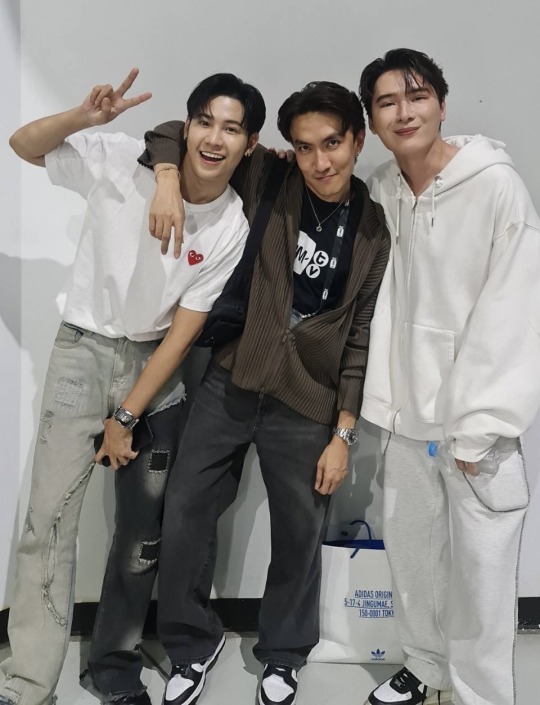
By now I think many people have heard that KristSingto’s upcoming series is an original script that was written for them. What we also have confirmed is that it was written about them.
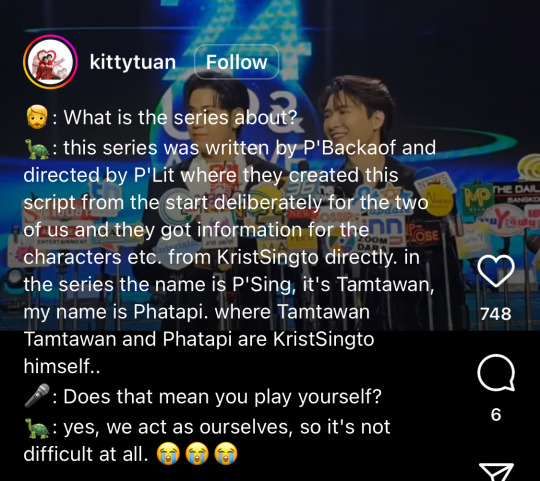
[source]
KRIST: This series was written by P'Backaof and directed by P'Lit where they created this script from the start deliberately for the two of us and they got information for the characters etc. from KristSingto directly. In the series, the name for P'Sing is Tamtawan, and my name is Phatapi. And Tamtawan Tamtawan and Phatapi are KristSingto themselves.
INTERVIEWER: Does that mean you play yourself?
KRIST: [laughing] Yes, we act as ourselves, so it's not difficult at all.
Today, Aof elaborated on his part on Twitter:
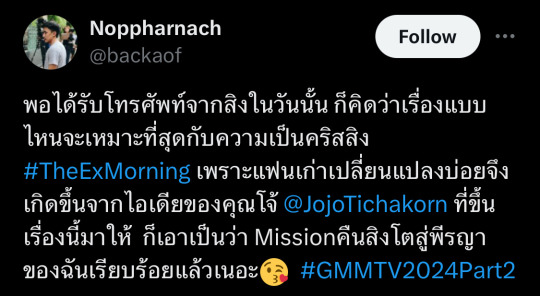
[source: @backaof]
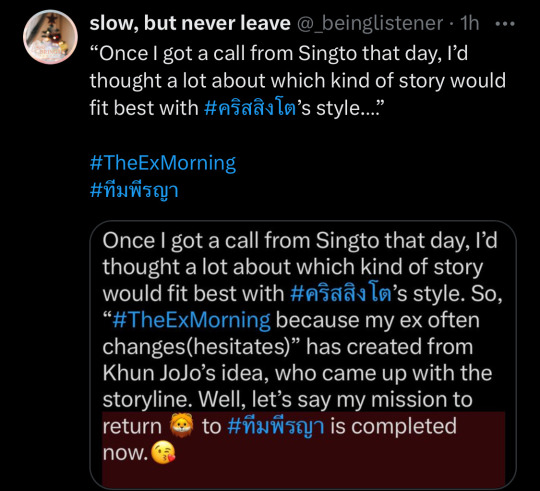
[translation: @_beinglistener]
And Jojo added:
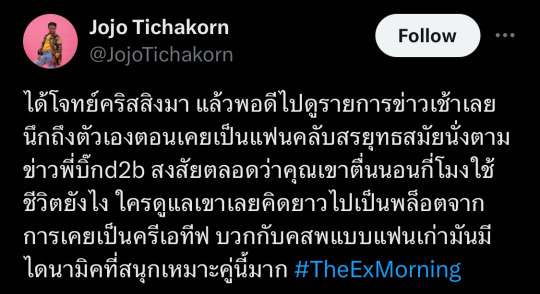
[source: @jojotichakorn]
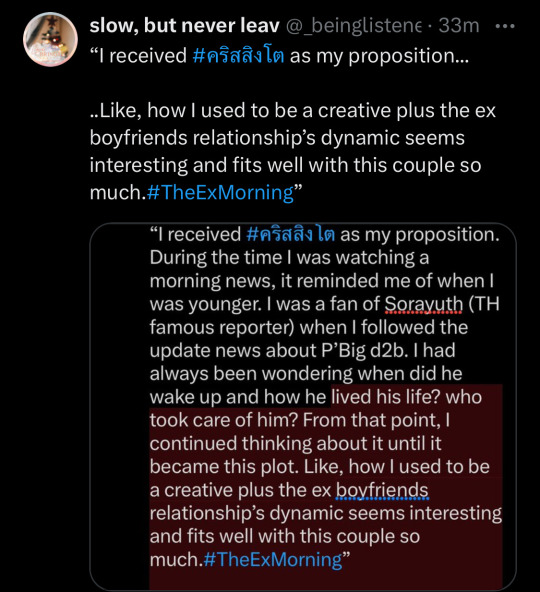
[translation: @_beinglistener]
So, two gay men are the leading creative minds behind KristSingto’s comeback series. Time to study up on your KristSingto history, kids. \:D/
Long live sanctioned RPF. 🎉

#krist perawat#singto prachaya#kristsingto#the ex morning#i’ve already seen the same tired ‘guess rent was due’ about krist and#i see on twitter when people link my thread about krist to people still insisting he’s homophobic#man’s rich#he works constantly#he even said it’s something he regrets now that his grandmother who raised him passed away#he worked so much he didn’t have as much time for his family—who he helps support#he is quite literally considered bl royalty#he has more queer people in his circle than straight#waa (gay) is his mentor#aof (gay) wrote this series and jojo (gay) thought up the concept so even professionally he's supported by queer people#you don’t have to like him#and you don’t have to admit to sending death threats to a stranger who doesn’t speak your language based on rumors you didn’t verify#just y’know#admit quietly to yourself alone in your head that you were wrong and you caused harm to a person who didn’t deserve it#plenty of actors use bl as a stepping stone to bigger jobs#he’s not one of them#he wanted to do bl for years but gmmtv told him he could only work with singto#so literally the only reason kit didn’t do bl until BMF was scheduling issues because singto wanted to study abroad#and singto couldn’t get a fixed date for it and then the pandemic messed with his plans even more#i’m glad to see more and more people are understanding who krist is recently#and even in the series they made pathapi’s controversy an impulsive act of anger#krist has said he used to struggle with being hotheaded#and one of his apologies for the igs was even something like ‘i acted without thinking of how it would look out of context’#he just wanted people to stop harassing him for his sexuality but the context isn’t in the igs#anyway my go-to when i’m too tired to talk about this is always this#if he had ever been homophobic thai people would be the ones leading the charge against him…but it’s interfans
75 notes
·
View notes
Text
hello everyone!
just joined studyblr and langblr to meet some lang lovers and generally get my ass to study, never used this app before so be patient with me i beg i have no idea what i am doing lol
speak: 🇵🇱🇬🇧
intermediate: 🇯🇵🇨🇳
basic: 🇫🇷🇧🇬
want to learn: 🇷🇺🇰🇷
let’s be study buddies !!
#langblr#studyblr#how it even works help#japanese studyblr#chinese studyblr#russian studyblr#linguistics#study blog#i need language friends or i will go insane my motivation is ZERO
56 notes
·
View notes